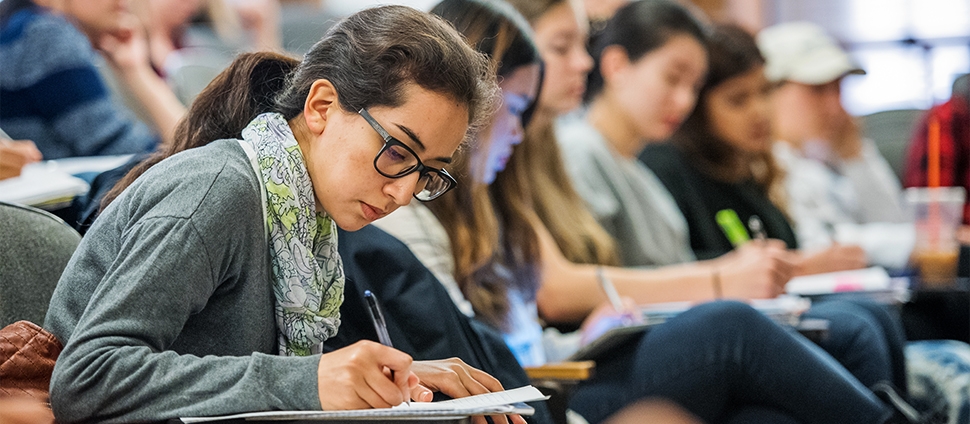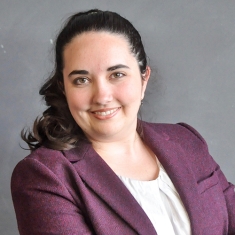The Economics department offers two majors: Economics (ECO) and the STEM-designated Quantitative Economics (QEC). Our students gain the skills and insights that enable them to tackle pressing economic, social, and political issues including Inflation and unemployment, high prices of health care service and limited access to health care, racial and gender disparities, inequality, environment and climate change, economic development, economic growth and finance, and the complexities of the global economy.
Students develop economic intuition and learn about the suite of tools utilized by economists, including econometric models, data analytics, and experimental designs. Numerous opportunities exist for students to further their economic knowledge on campus by participating in various faculty-run research labs and off campus by taking advantage of a Junior Year Study Abroad program that offers both English-language and foreign-languages options.
Many of our students pursue economics with career aspirations in diverse fields like banking, finance, business, technology, consulting, and law. Others leverage the intellectual rigor and societal relevance of the field as a springboard for varied careers in nonprofit organizations, policy institutions, government agencies, Federal Reserve Banks, and academia. Moreover, the study of economics extends considerable benefits to nonmajors as it serves as an essential aspect of a well-rounded liberal arts education, cultivating informed citizenship, and facilitating enriched decision making.
- Understand and synthesize the basic concepts of economics
- Use those economic concepts to solve problems, particularly in the realm of public policy
- Consider different perspectives in the approach to solving problems
- Develop critical thinking
- Conduct independent research
- Develop an ability for abstract reasoning based on tight, clear logic
- Develop quantitative skills for data management and systematic empirical analysis
- Develop a precise writing style
- Develop a facility for effective oral presentation
Advisers
Terry-Ann Craigie, Deborah Haas-Wilson, Mahnaz Mahdavi, James Miller, Roisin O’Sullivan, Susan Stratton Sayre, Lucie Schmidt, Vis Taraz, Argyris Tsiaras, Jorge Vasquez, Pun Winichakul, Mariyana Zapryanova
Basis for the major
150 and 153
Economics Track: The five courses in the core—150 and 153 or their equivalent, 220, 250 and 253—plus five other courses in economics including one seminar. ECO 220 may be replaced in the core with SDS 201 (when taken at Smith), SDS 220 or SDS 291. In the case of SDS 201 and SDS 220, the students will be required to take six rather than five economics courses beyond the core. ECO 220 may be replaced by SDS 201 transfer credit with the permission of the faculty major adviser or department chair. Students who have already taken any of GOV 203, SOC 204, SDS 201, PSY 201 or SDS 220 may not receive college or major credit for ECO 220. MTH 111 or its equivalent is a prerequisite for 250 and 253.
Quantitative Economics Track (with STEM designation): The six courses in the core—150 and 153 or their equivalent, 220, 240, 250 and 253—plus five other courses in economics, including two upper-level courses (254-299) and one seminar. ECO 220 may be replaced in the core with SDS 201 (when taken at Smith), SDS 220 or SDS 291. In the case of SDS 201 and SDS 220, the students will be required to take six rather than five economics courses beyond the core. ECO 220 may be replaced by SDS 201 transfer credit with the permission of the faculty major adviser or department chair. Students who have already taken any of GOV 203, SOC 204, SDS 201, PSY 201 or SDS 220 may not receive college or major credit for ECO 220. MTH 111 or its equivalent is a prerequisite for 250 and 253.
AP calculus with a score of 4 or 5, International Baccalaureate (IB) math with a score of 5, 6 or 7 for higher level exams, and A-levels math with a grade of A or B on advanced level exams are considered equivalent to MTH 111 in fulfilling the prerequisite requirement for ECO 250 and ECO 253. Other pre-matriculation coursework is reviewed on a case-by-case basis.
Students who pass the department's placement examination in microeconomics or macroeconomics, or who pass the AP examination in microeconomics or macroeconomics with a score of 4 or 5, or who have the appropriate grades in A-level or IB courses in economics, may count this as the equivalent of 150, 153 or both. Course credit toward the major will be granted as long as the overall number of economics credits (not including those from one- and two-credit special studies) recorded on the transcript is at least 36. Students with AP, A-level or IB credit are urged to take the placement exams to ensure correct placement.
With prior permission of the instructor, economics credit will be given for public policy and for environmental science and policy courses, when taught by a member of the economics department. Economics credit will not be given for ACC 223.
The S/U grading option is not allowed for courses counting toward the economics major. An exception may be made in the case of 150 and 153.
Majors may spend their junior year abroad if they meet the college’s requirements. Only 4 semester course credits (and no more than 2 in any one semester) taken by a Smith student outside the five colleges may be counted toward the courses required for the major. This includes courses taken during study abroad or study away, and courses taken in summer school or during a leave of absence from the college. Any course taken for economics credit outside the Five Colleges should normally have prior approval by the major adviser or the department's adviser for study abroad. Economics courses and appropriate statistics courses taken by transfer students before their matriculation to Smith and approved by the department and the college will be counted toward the major as if they had been taken at Smith.
Majors may also participate in the Jean Picker Semester-in-Washington Program, administered by the Department of Government and described under the government major.
Advisers
Terry-Ann Craigie, Deborah Haas-Wilson, Mahnaz Mahdavi, James Miller, Roisin O’Sullivan, Susan Stratton Sayre, Lucie Schmidt, Vis Taraz, Argyris Tsiaras, Jorge Vasquez, Pun Winichakul, Mariyana Zapryanova
Requirements
Six courses in economics, consisting of 150, 153, 220, and three other courses in economics or 150, 153, a statistics course taken outside of the department, and four other courses in economics. Crediting procedures are the same as for the major.
Honors Director: Mariyana Zapryanova
The honors program offers qualified and highly motivated students an opportunity to work independently and on a more intensive basis with a faculty member. Students may pursue one of three paths when writing an honors thesis over the course of the senior year: i) complete a two-semester honors thesis, ii) extend a one-semester 4-credit special studies with one semester of honors thesis work in the following semester or iii) build on a research paper written for an economics seminar course with one semester of honors thesis work in the following semester. For paths ii) and iii), the special studies or seminar must be taken in the first semester of the senior year.
Applying for Honors
The GPA requirement for admission to the honors program is 3.50 or higher in the declared economics major (ECO or QEC) at the time of application to the honors program.
For the year-long honors thesis option, students are strongly encouraged to talk to faculty members about potential thesis topics throughout their junior year and to submit a proposal to the Department through the Director of Honors during the second semester of their junior year. However, the Department will also consider proposals submitted through the Director of Honors before the Department’s first meeting at the start of the applicant's senior year.
Applications to extend a special studies project or seminar paper with one semester of thesis work will be considered at the last meeting of the first semester or at the first meeting of the second semester of the applicant’s senior year. Students should submit their proposals to the Director of Honors before the department meeting at which their proposal is considered.
Application for admission to the honors program and related instructions are available from the Class Deans' website.
Requirements
- Basis: ECO 150 and 153, ECO 220, 250 and 253 (plus ECO 240 for QEC majors)
- 3 elective courses in economics for path i), or 4 (inclusive of the special studies or seminar) for paths ii) and iii)
- ECO 430D in both semesters of the senior year for path i), or ECO 430 in the second semester for paths ii) and iii)
It is highly recommended that honors students take ECO 220, 250 and 253 before the fall semester of their junior year. Students planning to undertake statistical analyses in their thesis should also take econometrics (ECO 240) before their senior year.
Thesis
The honors thesis is credited as a two-semester course (ECO 430D) receiving a total of 8 credits or as a one-semester course (ECO 430) receiving 4 credits combined with either a 4-credit special studies or a 4-credit economics seminar course. The normal course load is six additional 4-credit courses taken during the senior year. The honors student is encouraged not to take more than these 8 equivalent courses during her senior year so that she will have ample time for her thesis research. Financial support for student research is available.
Evaluation
Honors students must take an oral examination in economics, with emphasis on its application to the field of the thesis. For May graduates, the oral exam must be administered by the last day of classes of the spring semester, in line with the schedule outlined on the Class Dean's website. For January graduates, departmental deadlines require a final draft of the written thesis be submitted to the thesis advisor by the last day of classes and the oral exam be administered by the last day of the exam period in the fall semester.
Successful honors candidates will be graduated with honors in economics, high honors in economics or highest honors in economics. The level of honors is determined by the student's average grade in courses of her major, by the grade received on her oral honors examination and by the grade received on her written thesis. The grade received on the written thesis is by far the most important indication of the student's probable level of honors award. Most honors students receive honors in economics. Should the honors candidate's performance in the honors program be deemed unworthy of honors but still worthy of course credit, the student will receive a grade determined by her thesis adviser and will simply receive her degree without an honors designation.
Students may choose any of the following faculty as their major or minor advisor. Normally, this should happen during the fourth semester or at the time of major declaration, whichever comes first.
Theory
One of the purposes of the major is to help students look critically at the ways in which society organizes and manages resources. Without some framework within which to organize ideas—including dissenting ideas and criticism—analysis becomes aimless, diffuse, and, ultimately, ineffective. No one theory, or category of theory, must be accepted by all economists to be considered adequate to understand the economy; however, an understanding of the main theoretical tenets of modern economics is the touchstone from which almost all development, elaboration and criticism of economic arrangements flow.
Basic Theory
The basic theory is presented in the principles courses, ECO 150 and 153. This theory is developed more rigorously and embedded in more sophisticated economic models in the intermediate theory courses, ECO 250 and 253. Additional theory courses include game theory (ECO 125) and several advanced electives.
Statistics and Mathematics
Since economic knowledge is ultimately drawn from the real world, statistical techniques are an important tool both for gathering information and for testing economic theories against the world they seek to explain. These techniques are taught in our basic statistics course (ECO 220) and further developed in the econometrics course (ECO 240).
Economics has become increasingly mathematical. Calculus I (MTH 111) is strongly recommended as an adjunct to your economics major, and is required for the intermediate theory courses. Students planning to go to graduate school in economics need to take ECO 255 and 240 and at least four additional math courses (as listed below and in the catalogue).
Historical and Institutional Setting
If theory and statistics provide us with tools of analysis, then history and institutional forces provide the setting for economic problems and constraints on their solutions. Without an awareness of these realities, the use of theory, statistics and other sophisticated techniques is likely to lead into blind alleys and unwarranted conclusions. The study of history and institutions in courses such as labor economics, American economic history, economic anthropology, comparative economic systems and economic development, provide the opportunity to go beyond the abstractions of theoretical arguments to the analysis of real problems. Most "applied" courses naturally incorporate elements of history and institutional arrangements, and a few are primarily devoted to this issue. A major adds fundamentally to her comprehension of the subject by being exposed to thinking along these lines.
Empirical and Applied Analysis
In the end, if economics is to be respected it will not be because of the abstract beauty of its theory or the broad sweep of its historical insight. It will be studied and used only if it contributes to the understanding of particular problems. To that end, the economics major will take a number of courses in specific applied areas such as law and economics, urban economics, labor relations, public finance, money and banking, economic development, international trade and finance, economic growth, industrial organization, the economics of education, growth and crisis, and empirical and applied analysis. They use theory and draw on historical insights, but at their core are contemporary, practical, and policy-oriented.
Familiarity can be gained by applying basic tools to several areas, or by taking a sequence of several courses in one area. Both are useful and legitimate approaches to learning about economics and what economists do. Either can provide the student with the experience of applying the tools of economic inquiry. In these upper-level courses, theory, statistics and other tools of analysis are brought to bear on unsolved problems and unsettledquestions, in contrast to the emphasis in the introductory courses on what we already know.
A major curriculum designed in this way can contribute importantly to a student's gaining both competence in the economic way of thinking and confidence in her own knowledge of both its uses and inherent limitations. This is the underlying goal of majoring in economics in a liberal arts college, regardless of the subsequent uses to which it may be put.
ECO 125 Game Theory
An examination of how rational people cooperate and compete. Game theory explores situations in which everyone’s actions affect everyone else, and everyone knows this and takes it into account when determining their own actions. Business, military and dating strategies are examined. No economics prerequisite. Prerequisite: at least one semester of high school or college calculus. {S} Credits: 4
Normally offered each spring
ECO 127 The Magic of the Marketplace
An introduction to capitalism. Markets have made the average American richer than any medieval king. Take this course to find out why. Other topics covered include innovation, discrimination, prostitution, environmental economics, international trade, affirmative action, business competition, price gouging, illegal drugs, Internet piracy, baby auctions, inequality and IQ, the stock market, the minimum wage, an economic love story, the economics of government, and why Africa is poor. This course is less mathematical than Economics 150. Open only to junior and senior non-economics majors or minors. A student may not receive credit for both ECO 127 and ECO 150 (or its equivalent), nor for both ECO 127 and ECO 123. (E) {S} Credits: 4
Normally offered in alternate years
ECO 150 Introductory Microeconomics
How and how well do markets work? What should government do in a market economy? How do markets set prices, determine what is produced and decide who gets the goods? We consider important economic issues including preserving the environment, free trade, taxation, (de)regulation and poverty. {QS} {S} Credits: 4
Normally offered both fall and spring semesters
ECO 153 Introductory Macroeconomics
An examination of current macroeconomic policy issues, including the short and long-run effects of budget deficits, the determinants of economic growth, causes and effects of inflation, and the effects of high trade deficits. The course focuses on what, if any, government (monetary and fiscal) policies should be pursued in order to achieve low inflation, full employment, high economic growth and rising real wages. {S} Credits: 4
Normally offered both fall and spring semesters
ECO 220 Introduction to Statistics and Econometrics
Summarizing, interpreting and analyzing empirical data. Attention to descriptive statistics and statistical inference. Topics include elementary sampling, probability, sampling distributions, estimation, hypothesis testing and regression. Assignments include use of statistical software and micro computers to analyze labor market and other economic data. Prerequisite: ECO 150 or ECO 153. Students are not given credit for both ECO 220 and any of the following courses: GOV 190, SOC 201, MTH 201, PSY 201 SDS 220. Course limited to 55 students. {M} {QS} {S} Credits: 5
Normally offered both fall and spring semesters
ECO 280 Economic Research Methods
An introduction to the research workflow in economics. Drawing on examples from a variety of economic fields, students will learn how to search, read, and write about the economic literature and to generate reproducible economic data analysis using statistical software like R and Stata. The course focuses on the practical skills needed to apply the tools from economic theory and econometric methods to real economic resarch questions. Prerequisite: one of ECO 220, ECO 240, SDS 291 and one of ECO 250 or ECO 253. (E) {S} Credits: 4
Normally offered each academic year
ECO 240 Econometrics
This course introduces students to the basic principles of econometrics and the methods used to present and analyze economic data. Knowledge of statistical methods is essential for understanding and evaluating critically much of what is written about economics and social policy. The main goal of the course is for you to leave it as an informed and critical consumer of empirical studies and with the foundational skills to conduct your own original empirical research. Prerequisites: ECO 150, ECO 153, MTH 111 and either ECO 220, SDS 220 or SDS 291. {M} {S} Credits: 4
Normally offered each academic year
ECO 250 Intermediate Microeconomics
Focuses on the economic analysis of resource allocation in a market economy and on the economic impact of various government interventions, such as minimum wage laws, national health insurance and environmental regulations. Covers the theories of consumer choice and decision making by the firm. Examines the welfare implications of a market economy, and of federal and state policies which influence market choices. Prerequisites: ECO 150 and MTH 111 or its equivalent. Enrollment limited to 55 students. {S} Credits: 4
Normally offered both fall and spring semesters
ECO 253 Intermediate Macroeconomics
Builds a cohesive theoretical framework within which to analyze the workings of the macroeconomy. Current issues relating to key macroeconomic variables such as output, inflation and unemployment are examined within this framework. The role of government policy, both in the short run and the long run, is also assessed. Prerequisites: ECO 153 and MTH 111 or its equivalent. Enrollment limited to 55 students. {S} Credits: 4
Normally offered both fall and spring semesters
ECO 254 Behavioral Economics
An examination of the combination of economists’ models and psychologists’ understanding of human behavior. This combination fosters new understanding of consumers’ and firms’ decision-making. Topics include decisions motivated by issues of fairness or revenge (rather than self-interest); decisions based on the discounting of future happiness; decisions based on individuals’ incorrect beliefs about themselves (such as underestimating the power of bad habits or cravings). This new understanding has implications for economic, political, legal and ethical issues. Prerequisites: ECO 220 and ECO 250. (E) Credits: 4
Expected to be offered in the next three years
ECO 255 Mathematical Economics
Review of mathematical techniques required for a rigorous study of economics. Extensive instruction on applications of these techniques to economic problems will be provided. Emphasis will be put on static and dynamic optimization and comparative statics. Applications to microeconomics, macroeconomics, and financial economics will be discussed. The course prerquisites are ECO 250, ECO 253, MTH 211, and MTH 212 or permission of the instructor.{M} {S} Credits: 4
Expected to be offered in the next three years
ECO 256 Topics in Applied Microeconomic Theory
This course prepares students to understand and construct mathematical models for applied microeconomic analysis. The course covers both mathematical techniques and their economic applications. Emphasis particularly on the use of constrained optimization and comparative statics to undertake positive and normative analysis of selected government policies. Prerequisites: MTH 111, 112, 211, 212 and ECO 250 or permission of instructor.{M} {S} Credits: 4
Expected to be offered in the next three years
ECO 258 Applied Market Design
In 2012, the Nobel Memorial Prize in Economics Sciences was awarded to Alvin Roth and Lloyd Shapley for their theoretical and practical work on the design of markets. This course provides an introduction to the field of market design, focusing on the functioning of specific markets and market mechanisms. Applications include but are not limited to: auctions, kidney exchange, medical match, school choice, course allocation, and trading on the stock market. In addition, we will study the market design aspects of new technologies that facilitate new types of marketplaces, such as cryptocurrencies and taxi-ride platforms. Prerequisite: ECO 250 or permission of the instructor. {S} Credits: 4
Expected to be offered in the next three years
ECO 271 The Economics of Climate Change
Climate change has been recognized as "the major, overriding environmental issue of our time, and the single greatest challenge facing environmental regulators” by the United Nations Secretary General. In this class we use the tools of economics to analyze and understand the many challenges of climate change. Topics covered include climate damages, market failure and externalities, emissions standards and taxes, cap and trade, discounting, risk and uncertainty, mitigation and integrated assessment models, adaptation, development, and gender. Prerequisites: ECO 220 and ECO 250. (E) {S} Credits: 4
Normally offered in alternate years
ECO 272 Law and Economics
An economic analysis of legal rules and cases. Topics include property law, contract law, accident law, criminal law, the Coase theorem and the economics of litigation. Prerequisite: ECO 250. {S} Credits: 4
Expected to be offered in the next three years
ECO 360 Seminar: Economics of Crime
This course is designed with two central goals. First, use microeconomic and econometric tools to explore and understand crime and incarceration. Relevant topics include but are not limited to: non-violent and violent crime, gun control, drug control, policing, incarceration, and racial biases in the criminal justice system. Second, develop the key tools for economic work including analytical thinking, strong quantitative, research and presentation skills. Prerequisites: ECO 220 and ECO 250 or permission of the instructor. {S} Credits: 4
Expected to be offered in the next three years
PPL 220 Public Policy Analysis
Analysis of the institutions and processes of public policy formation and implementation. Explores models designed to explain policy and also those whose purpose is to “improve” policy. Develops and uses analytical tools of formal policy analysis. Examines the debate over the possible and proper uses of these analytic tools. {S} Credits: 4
Normally offered in alternate years
ECO 201 Gender and Economics
This course uses economic analysis to explore how gender differences can lead to differences in economic outcomes in households and the labor market. Questions to be covered include: How does the family function as an economic unit? How do individuals allocate time between the labor market and the household? How have changes in family structure affected women's employment, and vice-versa? What are possible explanations for gender differences in labor force participation, occupational choice, and earnings? What is the role fo government in addressing gender issues in the home and the workplace? How successful are government policies that primarily affect women? Prerequisite: ECO 150. {S} Credits: 4
Normally offered in alternative years
ECO 222 Economics of Race, Policy, and Mass Incarceration
The United States has the world's highest incarceration rate at more than five times the global median. Our country is regrettably distinguished by significant racial-ethnic and gender disparities in its carceral population. This course uses the tolls of economic analysis to address three main questions: First, how did we get here, that is, how did the United States become the world's leader in incarceration? Second, what are the economic implications and collateral consequences of racialized mass incarceration? Finally, what can we do about it, that is, can we use economic tolls to examine the efficacy of criminal justice reform? Prerequisite: ECO 150 {S} Credits: 4
Normally offered each academic year
ECO 224 Environmental Economics
The economic causes of environmental degradation and the role that markets can play in both causing and solving pollution and resource allocation problems. Topics include resource allocation and sustainability, cost-benefit analysis, pollution standards, taxes, and permits, public goods and common property resources. Prerequisite: ECO 150. {S} Credits: 4
Normally offered each academic year
ECO 230 Urban Economics
Economic analysis of the spatial structure of cities—why they are where they are and look like they do. How changes in technology and policy reshape cities over time. Selected urban problems and policies to address them include housing, transportation, concentrations of poverty, financing local government. Prerequisite: ECO 150. {S} Credits: 4
Normally offered each academic year
ECO 260 Public Economics
This course surveys the field of Public Economics (also know as Public Finanace), which explores the reasons for government intervention in the economy, the extent of that intervention, and the response of private agents to the government’s actions. The central goal of the course is to use microeconomic theoretical tools to explore and understand government intervention in the market and to analyze government expenditure programs and tax policy. Relevant topics include but are not limited to welfare reform, income inequality, education, health care, social security and tax reform.
Prerequisite: ECO 250. Recommended: ECO 220. {S} Credits: 4
Normally offered in alternate years
ECO 263 Labor Economics
This course is designed to give students a broad overview of the economic issues associated with the labor markets. Topics to be covered include labor demand; labor supply; compensating wage differentials; investments in human capital; migration and immigration; the dtermination of wages; gender/race/ethcicity in labor markets; unemployment; and inequality in earnings. Prerequisites: ECO 250 and ECO 220 {S} Credits: 4
Normally offered in alternative years
ECO 265 Economics of Corporate Finance
An investigation of the economic foundations for investment, financing and related decisions in the business corporation. Basic concerns and responsibilities of the financial manager, and the methods of analysis employed by them are emphasized. This course offers a balanced discussion of practical as well as theoretical developments in the field of financial economics. Prerequisites: ECO 250, ECO 220 and MTH 111. {S} Credits: 4
Normally offered each fall
ECO 275 Money and Banking
An investigation of the role of financial instruments and institutions in the economy. Major topics include the determination of interest rates, the characteristics of bonds and stocks, the structure and regulation of the banking industry, the functions of a modern central bank and the formulation and implementation of monetary policy. Prerequisite: ECO 253 or permission of the instructor. {S} Credits: 4
Normally offered in alternate years
ECO 314 Seminar: Industrial Organization and Antitrust Policy
An examination of the latest theories and empirical evidence about the organization of firms and industries. Topics include mergers and acquisitions, advertising, strategic behaviors, vertical restrictions such as resale price maintenance and exclusive dealing, and antitrust laws and policies. Prerequisite: ECO 250. {S} Credits: 4
Normally offered each academic year
ECO 324 Seminar: Economics of the Enviroment and Natural Resources
How do we expect competitive markets to allocate natural resources? Will market systems result in excess pollution? Can we improve market outcomes in relation to the environment and natural resources? If so, what are the relative strengths and weaknesses of different approaches? This course examines these issues through discussion of the economic theories of externalities, common property and public goods and their implications for the allocation of resources. We explore these questions by analyzing specific policy issues and debates related to the environment and resource use including: climate change, pollution, biodiversity, energy, sustainability, land use and fishing rights. Through this exploration, we touch upon a number of other theories and techniques including dynamic optimization and intertemporal choice, price vs. quantity regulation, nonmarket valuation, cost-benefit analysis and the use of incentive-based regulation. Prerequisites: ECO 250 and ECO 220 or permission of the instructor. {S} Credits: 4
Normally offered in the next three years
ECO 331 Seminar: The Economics of Sports
This seminar will explore economic principles behind the operation of the sports industry in the United States and internationally. Specific topics to be covered include: antitrust; athlete compensation; labor market behavior; competitive balance; team value and profitability; economic impact and financing of stadiums; economics of the Olympics and World Cup; and, economic issues in college sports. Prerequisites: ECO 250 and ECO 220.{S} Credits: 4
Normally offered each spring
ECO 341 Economics of Health Care
An examination of current economic and public policy issues in health-care. Topics include markets for health insurance, physician services, and hospital services; public policies to enhance health care quality and access; the economics of the pharmaceutical industry; and alternatives for reforming the U.S. health-care system. Prerequisites: ECO 250 and 220 or permission of the instructor. {S} Credits: 4
Expected to be offered in the next three years
ECO 351 Seminar: The Economics of Higher Education
An exploration of several of the following topics in the economics of higher education: the economic returns to a college education; the additional economic returns to attending an elite college; the determinants of college admissions; the role of SAT scores in determining performance in college; the construction and effects of the U.S. News rankings of colleges; peer effects in colleges; and the current (and future) crisis in funding higher education. The course emphasizes empirically testing economic hypotheses using several databases. Prerequisites: ECO 250 and ECO 220. {S} Credits: 4
Expected to be offered in the next three years
ECO 361 Seminar: Economics of Discrimination
It is hotly debated whether and to what extent observable outcome differentials in various markets can be attributed to the effects of discrimination. This course will critically explore various discrimination topics, paying special attention to the evidence in the economics literature that potentially proves or disproves the presence of descrimination. A critical skill essential to the economic analysis of discrimination is the use of econometrics in analyzing discriminatory practices. We will explore the main econometric methods used to measure discrimination, debate their strengths and limitations, as well as discuss the economic implications for anit-discriminatory policies. Prerequisities: ECO 250 and ECO 220. {S} Credits: 4
Expected to be offered each academic year
ECO 364 Seminar: The Economics of Future Technology
Machine learning, embryo selection, self-driving cars, nanotechnology, robot nurses, virtual teachers, cognitive enhancing drugs and artificial general intelligences are among the technologies that might have a large impact on our economy over the next few decades. This seminar uses the tools of microeconomics to explore the potential effects of these and other possible technologies and to explain how economic incentives shape the types of technologies businesses develop. Prerequisite: ECO 250. {S} Credits: 4
Normally offered in the alternative years
ECO 211 Economic Development
An overview of economic development theory and practice since the 1950s. Why have global economic inequalities widened? What economic policies have been implemented in the developing countries of Asia, Latin America, Africa and the Middle East in search of economic development, what theories underlie these policies, and what have been the consequences for economic welfare in these regions? Topics include trade policy (protectionism versus free trade), financial policy, industrial development strategies, formal and informal sector employment, women in development, international financial issues (lending, balance of payments deficits, the debt and financial crises), structural adjustment policies and the increasing globalization of production and finance. Prerequisites: ECO 150 and ECO 153. {S} Credits: 4
Normally offered each academic year
ECO 219 The Chinese Economy
This course offers an analysis of the recent development of the Chinese economy, its rapid transformation in the post-Mao period, and the implications of this transformation for the welfare of Chinese households. Topics to be discussed include economic reform, trade liberalization, demography, inequality, health and environmental challenges. Fundamental topics in principles of economics will be covered in an intuitive way through topics pertaining to China. Course performance will be assessed through participation, in-class quizzes, literature critiques, and a final paper plus presentation. Prerequisite: ECO 150 and ECO 153. {S} Credits: 4
Normally offered each academic year
ECO 226 Economics of European Integration
Why would countries give up their own currencies to adopt a common new one? Why can citizens of Belgium simply move to France without any special formalities? This course investigates such questions by analyzing the ongoing integration of European countries from an economic perspective. While the major focus is on the economics of integration, account is taken of the historical, political and cultural context in which this process occurred. Major topics include the origins, institutions and policies of the European Union, the integration of markets for labor, capital and goods and monetary integration. Prerequisites: ECO 150 and ECO 153. Enrollment limit of 36. {S} Credits: 4
Normally offered in alternate years
ECO 238 Inequality and Economic Growth
An examination of the global dynamics and determinants of inequality in income and wealth and its interplay with economic growth. Beginning with an overview of growth at the country level, the course moves to examine the division of income between labor and capital, inequality in capital ownership, and inequality in labor earnings, ending with a discussion of policy proposals to address increasing inequality. Topics covered include the labor share, the concentration of wealth at the top, the skill premium, intergenerational mobility, managerial compensation, the racial and gender wage gaps, and offshore tax evasioin. (E) {S} Credits: 4
Expected to be offered in the next three years
ECO 295 International Trade and Commercial Policy
An examination of the trading relationships among countries and of the flows of factors of production throughout the world economy. Beginning with the theories of international trade, this course moves on to examine various policy issues in the international economy, including commercial policy, protectionism and the distribution of the gains from trade, multilateral trade negotiations, preferential trade agreements, the impact of transnational firms and globalization, immigration, and trade and economic development. Prerequisite: ECO 250. {S} Credits: 4
Normally offered each academic year
ECO 296 International Finance
An examination of international monetary theory and institutions and their relevance to national and international economic policy. Topics include mechanisms of adjustment in the balance of payments; macroeconomic and exchange-rate policy for internal and external balance; international movements of capital; and the history of the international monetary system: its past crises and current prospects; issues of currency union and optimal currency area; and emerging markets. Prerequisite: ECO 253. {S} Credits: 4
Normally offered each spring
ECO 311 Seminar: Topics in Economic Development
Topics course.
The Political Economy of Development in Africa
Since postcolonial times, Africa has seen both hope and despair for its development. This seminar explores the roles of many factors in the development of African states and the uplifting from poverty of individual Africans. In particular, we look at infrastructure and investment; health and education; trade; finance and markets; the choice of policy; and the effects of institutions, governance and politics. We also try to make sense of the differences and the similarities among the various paths to development in Africa. Prerequisites: ECO 250 and ECO 253; Recommended: ECO 211 or ECO 213. {S} Credits: 4
Expected to be offered in the next three years
The Economic Development of India
This seminar applies and extends microeconomic theory to analyze selected topics related to the India’s economic development. Throughout the course an emphasis is placed on empirically testing economic hypotheses using data from India. In particular, the following topics are explored, with reference to India’s growth and development: education, health, demographics, caste and gender, institutions, credit, insurance, infrastructure, water and climate change. Topics and assignments may be changed in response to the class’s particular interests. {S} Credits: 4
Normally offered in alternate years
ECO 319 Seminar: Economics of Migration
Who migrates? Why do they move? Where do they leave from and move to? What are the economic impacts? This course offers an overview of historical and current migration patterns, and examines the main theories and empirics behind the economics of migration -- its causes and consequences. The course concludes with a discussion of the policy implications, drawing examples from internal migration reform in China and current immigration policy debates in the U.S. Prerequisite: ECO 250, 253 and 220. {M} {S} Credits: 4
Expected to be offered in the next three years
ECO 338 Seminar: Household Finance and Inequality
How do individual economic decisions shape wealth inequality and economic mobility? This course examines topics at the intersection of household finance, the field of economics studying the financial decisions of households, and the economics of inequality. Beginning with an overview of the historical dynamics and theories of wealth inequality, we study recent empirical and theoretical findings on how household preferences and beliefs, financial portfolio investment mistakes, financing frictions, entrepreneurship, and taxes affect the distribution of wealth. (E) {S} Credits: 4
Expected to be offered in the next three years
ECO 375 Seminar: The Theory and Practice of Central Banking
What role do central banks play in the management of short-run economic fluctuations? What has driven the recent global trend towards more powerful and independent central-banking institutions? This course explores the theoretical foundations that link central bank policy to real economic activity. Building on this theoretical background, the monetary policy frameworks and operating procedures of key central banks are then examined. Much of the analysis focuses on the current practices of the U.S. Federal Reserve and the European Central Bank, with a view to identifying the relative strengths and weaknesses of the two institutions. Prerequisite: ECO 220, ECO 253 and a course in either international finance or money and banking such as ECO 275 or ECO 296. {S} Credits: 4
Normally offered in alternate years
ECO 395 Seminar: Topics in International Trade
The globalization of the world economy has contributed to both boom and crisis. This seminar explores selected topics relating to the increased openness of national borders to the flow of goods and services, labor and real capital. For 2017, the seminar will pay special attention to the impact of globalization on income inequality and national identity. In particular, we will examine whether international trade, immigration and emigration play a significant role in the growth of income inequality, both within and among nations, over the past several decades and, if they do, what, if anything, might be done to attenuate or reverse these trends? Prerequisites: ECO 250, and one 200-level course in international economics or the equivalent. {S} Credits: 4
Expected to be offered in the next three years
ECO 396 Seminar: International Financial Markets
This seminar focuses on four aspects of international financial markets: (1) International Portfolio Diversification with an emphasis on the role of the emerging economies; (2) Global Financial Crises and their impact on the economy; (3) Global Economic Imbalances provides an analysis of comparison of saver economies such as China, Germany and Japan with that of the borrowing economies such as the United States; (4) The Foreign Exchange Market focuses on currency crises and international disputes about China’s exchange rate policy. In studying each topic, both theoretical frameworks and empirical analyses are considered. Prerequisites: ECO 265 and ECO 296; Recommended: ECO 240. {S} Credits: 4
Expected to be offered in the next three years
Cross-listed Course
With prior permission of the instructor, economics credit will be given for Public Policy, Environmental Science and Policy, and for Middle East Studies courses when taught by a member of the economics department.
MES 220 The Arab Spring: Economic Roots and Aftermath
An exploration of the economic dynamics underlying the Arab Spring and the economic dimensions of the aftermath in the period since 2010. Considering the interaction between economic factors, on the one hand, and socio-political forces, on the other hand, as well as the global context and international pressures on the Arab region, we use a wide range of scholarly and other sources to examine and compare the developmental experience of various countries from North Africa and Egypt to the Levant, Iraq and the Arab Gulf. A previous course in Middle Eastern economics, politics, history or culture recommended, but not required. {H} {S} Credits: 4
Normally offered in alternate years
Study Abroad and Study Away Advisor: Professor James Miller
A junior year abroad information session for economics majors is held annually in October.
Our majors may spend a year or a semester in their junior year abroad or away in the United States if they meet the college’s requirements. Many of our majors have participated in junior Year study Abroad programs in either Smith sponsored programs (Geneva, Paris, Florence) or in any of the approved independent study abroad programs such as those in the U.K. (LSE, UCL, Edinburgh), Australia, New Zealand, and Latin America. Contact the Office for International Studies for all current available programs.
Students can also take advantage of study away opportunities and may spend a semester or year away in another college or university in the United States. Some of our students have spent their junior year in study away programs in universities, such as Columbia, Harvard, and New York.
A maximum of 4 semester course credits (and no more than 2 in any one semester) taken by a Smith student outside the Five Colleges may be counted towards the courses required for the majors (ECO, QEC) or the minor. This includes courses taken during study abroad or study away, and courses taken in summer schools or during a leave of absence from the college. Any course taken for economics credits outside the Five Colleges should normally have prior approval by the major advisor or the department’s advisor for study abroad.
We strongly recommend that students planning to study abroad or away complete at a minimum, the following five courses, ECO 150, ECO 153, ECO 220, ECO 250, ECO 253, during the first 4 semesters to have more options in course selections in their study abroad/away programs. Only courses taught by an economist will be considered for economics credit. The major adviser and the study abroad adviser must both sign the final plans of study before the student submits an application to the Office for International Study.
Students who plan to Study Away from Smith College during either semester of their senior year, whether in the United States or abroad please contact your Class Deans and/or the Economics Study Abroad and Study Away Advisor.
Emeriti
Mark Aldrich
Marilyn Carlson Nelson Professor Emeritus of Economics
Randall Bartlett
Professor Emeritus of Economics
Robert Buchele
Professor Emeritus of Economics
Roger Kaufman
Professor Emeritus of Economics
Karen Pfeifer
Professor Emerita of Economics
Thomas A. Riddell
Professor Emeritus of Economics
Charles P. Staelin
Professor Emeritus of Economics
Andrew Zimbalist
Robert A. Woods Professor Emeritus of Economics
Opportunities & Resources
Samuel Bowles Prize
This prize is awarded to majors in the graduating class for the most distinguished paper in economics. Submissions are due by the last day of classes and should be emailed to Kelley Dunphy. Questions should be directed to the chair of the department, Mahnaz Mahdavi.
Sidney S. Cohen Prize
This prize is awarded for outstanding work in the field of economics.
Larry C. Selgelid Memorial Prize
This award is given to a Smith senior for the greatest contribution to the Department of Economics.
To learn more about academic prize competitions, see the Dean of the College website.
Introductory Economics
Resources for Economists on the Internet
The oldest, most well-known, easy-to-use and probably most comprehensive site for economics data and economics information in general. It is sponsored by the American Economic Association.
Internet Resources for Economists
A list of Internet resources for economists.
Glossary of Research Economics
An extensive glossary of research economic terms.
Random Comments on Current Events in Economics
A blog dedicated to current events in economics.
EconLog: Library of Economics and Liberty
A blog on applying introductory economics everyday
Specific Topics in Economics
Economic Theory for Non-Economics
A discussion of a range of economic topics, including drug control and air pollution.
Game Theory
An introduction to the theory of games.
Archive for the History of Economic Thought
An extensive collection of important original works in economics, organized by McMaster University.
History of Economic Thought
A textbook on the history of economic thought, by William J. Barber.
Economic Data
Economic Data: FreeLunch.com
The Web's largest economic data library. Free, but you must register to use. Once you register you will gain access to 1.68 million data series, each of which you can easily export as an Excel file.
University of Michigan Data Sites
An impressive array of statistical data sites.
U.S. Data Sources
Economic Report of the President
Contains the most recent Economic Report of the President. The entire report can be browsed or parts of it can be downloaded. Make sure to check the table of contents for the statistical section, which is located about two-thirds of the way through the report.
FedStats.com
Includes data for more than 100 federal agencies; can be searched by topic or by agency.
STAT-USA/Internet
A service of the U.S. Department of Commerce, this is a single point of access to authoritative business, trade and economic information from across the federal government.
Board of Governors of the Federal Reserve System
Contains extensive data and information on monetary issues.
FRED: Federal Reserve Bank of St. Louise Economic Research
A good source of monetary data, this site has a program that automatically calculates the growth rates for its data series.
International Data Sources
United Nations Statistical Division
Contains a wealth of economic and socioeconomic data for hundreds of countries.
The International Monetary Fund (IMF)
An excellent source of international data and reports.
The CIA World Factbook
Useful information about many countries, although not as lurid as you might imagine.
What can I do with a major in economics?
Individuals with training in economics are well prepared for a variety of careers. In most cases, the rigor and precision of technical training in economics will give the graduate a competitive advantage. In virtually all fields, the ability to write clearly and convincingly is a major asset. Majors are strongly urged to take courses that will develop their writing skills both within and outside the economics department.
Perhaps the most important aspect of planning an economics major involves keeping a number of options open. Specifically, flexibility depends on your having taken the basic courses early in the major. Economics 220 (formerly 190), 250 and 253 should all be taken as early as possible. In addition, we recommend Math 111 (Calc. I), taken early for economics majors. For certain career paths, additional math is a necessity, typically through Linear Algebra, and taking it would certainly add to your options in this respect.
To learn more about careers in economics, watch a video from the American Economic Association.
Career Paths Related to Economics
Professional Economist
To be considered a professional economist, students must go on to graduate training leading to the M.A. or (more likely) the Ph.D. Economists are employed in academia, business and government, but their basic training almost always involves graduate school in economics. Students contemplating graduate school in economics should see their adviser and check the catalogs of a variety of schools to determine their entrance requirements. Your adviser will nearly always recommend more math. You are advised to master the material in ECO 255 and 240 as well as MTH 111, 112, 211, 212, 280 and 281. Aside from these suggestions, no other courses specifically must be taken, although you might take a number of more advanced, somewhat technical, courses to see if you enjoy doing what economists do.
Graduate Business School (M.B.A.)
Individuals contemplating administrative or business careers should seriously consider obtaining advanced training in business. In virtually all instances your employment opportunities will be enhanced if you do this.
Preparation for business school includes attention to economic theory, as well as to mathematics and statistics. You should plan to take calculus early in your career, and while it is somewhat less essential than for those pursuing a doctorate, taking math through linear algebra and econometrics is helpful. Taking "business type" courses, such as accounting and finance, may certainly help inform you about some of the subjects you will take in business school and the things you might be dealing with in a business career. Although an accounting course is offered at Smith (ACC 223), it does not count toward the course requirement for the major.
Business schools vary. Some are quite quantitative or theory oriented, others less so. Note, however, that if you choose a course of study that avoids quantitative studies and math, you tend to reduce your options, while if you do stress these areas, you can still go to a nontechnical business school if you wish.
Finally, note that an M.B.A. is useful training for many nonbusiness jobs, such as administrative positions in nonprofit institutions (e.g., health, the arts, government). It will therefore often be a prelude to many of the careers noted as follows.
Public Policy (Master of Public Policy)
Public policy programs are generally similar to business school programs, but with a greater emphasis on roles of government, the economy and on the tools of public policy analysis. As with master's programs, there is a range of emphasis on quantitative content.
Law (J.D. or L.L.B.)
Especially useful for law school are courses developing analytical skills (theory). There is less emphasis on specific quantitative skills, although law training is becoming increasingly quantitative at the best schools. Courses in government regulation, law and labor law might be of special interest, but are in no sense an absolute requirement. Some accounting could be useful to you. Courses dealing with government or the sociology of crime might be useful adjuncts.
Labor Relations (M.A.)
A general major with attention to the labor and industrial relations courses—both in the economics department and in other departments (e.g., sociology and history)—is the best preparation for these programs.
Governmental (Federal)
In Washington, you will find opportunities for employment with both the legislative and executive branches of the government. Openings in the offices of senators and congressmen are not frequent, but they do exist. The greater number of possibilities occur within the various congressional committees. Those committees from the House of Representatives that hire a good number of economists include: Ways and Means, Education and Labor, Banking and Currency, Interstate and Foreign Commerce, Appropriations and Agriculture; and these from the Senate: Finance, Labor and Public Welfare, Banking and Currency, Interstate and Foreign Commerce, Appropriations and Agriculture and Forestry. Executive departments that hire economists, some of them in fairly large numbers, include (but are not limited to): the departments of State, Treasury, Labor, Health, Education, and Welfare, Commerce, Agriculture and Defense.
Other agencies and arms of the executive branch of government that hire economists are: the Federal Reserve System, the Federal Trade Commission, and the other regulatory commissions such as the C.A.B., L.C.C., F.C.C., F.P.C., the Federal Deposit Insurance Corporation, Central Intelligence Agency, Council of Economic Advisers, International Cooperation Administration. Field courses depend on the agency or office you are concerned with (e.g., money and macro for the Federal Reserve System), but in every case you should have a strong grounding in quantitative and writing skills. Much of your work is likely to involve research and report preparation, in which these skills will be essential.
Governmental (State and Local)
Many of the comments described in the federal government fields hold here as well. State and local governments have many different offices and agencies.
Quantitative and writing skills are again of primary importance. In addition, courses in the regional or urban economics area, and in public finance, would be a plus.
Secondary Education
An economics major can be certified to teach social science at the high school level with a few additional courses, including a practicum in education. Check the education department section in the Smith College catalog for courses.
International Organizations
These include the U.N., O.E.C.D., L.L.O., World Bank, L.M.F., and many, many others. Important courses include international trade and finance and economic development, as well as a good preparation in quantitative skills. Other courses in specific areas of interest (labor, agriculture, comparative systems, area studies) can also be helpful.
Private Business
Here the possibilities are so widespread that enumeration is impossible. Preparation would be similar to that for those going on to graduate business school, except that somewhat more attention should be given to immediately marketable skills. Even so, most businesses are looking for bright, trainable people who have exhibited the capacity for hard work, regardless of the particular courses they have taken.
Private Research and Consulting
A number of firms employ people to undertake economic research. They include Data Resources, Charles River Associates, RAND, and many others.
Courses in regional and urban, public finance, land use, and econometrics are useful since many of these firms' contracts fall in these areas.
Other Fields
There are many fields in which some undergraduate economics training is useful, including medicine and public health, environmental studies, social work and international relations.
Seminar Series
Fall 2023 Seminars
October 27, 2023
David Autor, MIT
November 17, 2023
Anne Piehl, Rutgers University
December 8, 2023
Alex Chan, Harvard University
Past Seminars
2022–23
- April 14, 2023 - Jakina Debnam Guzman, Amherst College
- March 31, 2023 - Aurelie Ouss, University of Pennsylvania
- December 1, 2022 - Sandra Goff, Bates College
- November 8, 2022 - Brian Baisa, Amherst College
- October 28, 2022 - Laura Wherry, NYU Wagner Graduate School of Public Service
2021–22
- April 18, 2022 - Sandile Hlatshwayo, International Monetary Fund
- April 11, 2022 - Luis Baldomero-Quintana, William & Mary
- April 8, 2022 - Arindrajit Dube, University of Massachusetts Amherst
- March 31, 2022 - Liz Ananat, Barnard College
- December 6, 2021 - Jaqueline Oliveira, Rhodes College
- November 18, 2021 - Olga Shurchkov, Wellesley College
- November 8, 2021 - Dave Bjerk, Claremont McKenna College
Contact
Wright Hall #226
Smith College
Northampton, MA 01063
Email: kdunphy@smith.edu
Administrative Assistant: Kelley Dunphy
Course and credit questions should be directed to the department chair Mahnaz Mahdavi.
Individual appointments may be arranged directly with the faculty.















